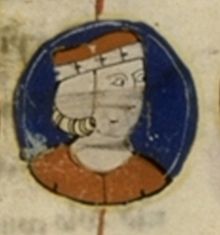Robert I, Count of Dreux
Robert I, Count of Dreux | |
|---|---|
 Robert I Capet | |
| Born | c. 1123 |
| Died | 11 October 1188 (aged 64–65) probably Braine |
| Noble family | House of Dreux |
| Spouse(s) | Agnes de Garlande Hawise of Salisbury Agnes de Baudemont |
| Father | Louis VI of France |
| Mother | Adélaide de Maurienne |
Robert I of Dreux, nicknamed the Great (c. 1123 – 11 October 1188), was the fifth son of Louis VI of France and Adélaide de Maurienne.[1]
Life[]
In 1137 he received the County of Dreux as an appanage from his father.[2] He held this title until 1184 when he granted it to his son Robert II.
In 1139 he married Agnes de Garlande.[3] In 1145, he married Hawise of Salisbury,[4] becoming count of Perche, as regent to his stepson Rotrou IV. By his third marriage to Agnes de Baudemont in 1152,[5] he received the , and the lordships of Fère-en-Tardenois, , Nesle, Longueville, Quincy-en-Tardenois, , and Baudemont.[6]
Robert I participated in the Second Crusade and was at the Siege of Damascus in 1148.[7] He was credited for bringing the Damask rose from Syria to Europe.[citation needed] In 1158, he fought against the English and participated in the Siege of Séez in 1154.
Marriages and children[]
1. Agnes de Garlande (1122–1143), daughter of Anseau de Garlande, .[3]
- Simon (1141 – bef. 1182), lord of La Noue
2. Hawise of Salisbury (1118–1152), widow of Rotrou III and daughter of Walter Fitz Edward of Salisbury, Sheriff of Wiltshire
- Adèle of Dreux (1145 – aft. 1210), married firstly Valéran III, ,[8] secondly Guy II, lord of Châtillon-sur-Marne,[9] thirdly Jean I de Thorotte, fourthly Raoul III de Nesle, count of Soissons.[10]
- Alice or Adelheid (1144–?)
3. Agnes de Baudemont, Countess of Braine, widow of Milo III of Bar-sur-Seine (1130 – c. 1202).[6]
- Robert II (1154–1218), count of Dreux and Braine.[11]
- Henry (1155–1199), bishop of Orléans
- Alix (1156 – aft. 1217), married Raoul I, lord of Coucy[10]
- Philippe (1158–1217), bishop of Beauvais.[11]
- Isabella (1160–1239), married Hugh III of Broyes[12]
- Peter (1161–1186)
- William (1163 – aft. 1189), lord of Braye, Torcy, and Chilly
- John (1164 – aft. 1189)
- Mamilie (1166–1200)
- Margaret (1167–?), nun
References[]
- ^ Previté-Orton 1979, p. 462.
- ^ Wood 1966, p. 7.
- ^ Jump up to: a b Michel 1902, p. 69.
- ^ Power 2004, p. 239.
- ^ Fedorenko 2013, p. 170.
- ^ Jump up to: a b Power 2004, p. 214.
- ^ Suger 2018, p. 167.
- ^ Dyggve 1935, p. 73.
- ^ Dyggve 1942, p. 11.
- ^ Jump up to: a b Pollock 2015, p. 92.
- ^ Jump up to: a b Gilbert of Mons 2005, p. 110.
- ^ Pollock 2015, p. 145.
Sources[]
- Dyggve, Holger Petersen (1935). "Personnages historiques figurant dans la poésie lyrique française des XII e et XIII e siècles. III: Les dames du »Tournoiement» de Huon d'Oisi". Neuphilologische Mitteilungen. 36 (2).
- Dyggve, Holger Petersen (1942). "Personnages historiques figurant dans la poésie lyrique française des XII e et XIII e siècles XIV: Identification de Noblet, ami de Conon de Béthune, Gace Brulé et Pierre de Molins". Neuphilologische Mitteilungen (in French). 43, No. 1: 7-20.
- Fedorenko, Gregory (2013). "The Thirteenth Century Chronique De Normandie". In Bates, David (ed.). Anglo-Norman Studies XXXV: Proceedings of the Battle Conference 2012. The Boydell Press.
- Gilbert of Mons (2005). Chronicle of Hainaut. Translated by Napran, Laura. The Boydell Press.
- Michel, Edmond (1902). Histoire de la ville de Brie-Comte-Robert (in French). 1. Dujarric & Cie.
- Previté-Orton, C. W. (1979). The Shorter Cambridge Medieval History. 1, The Later Roman Empire to the Twelfth Century (10th ed.). Cambridge University Press.
- Pollock, M. A. (2015). Scotland, England and France After the Loss of Normandy, 1204-1296: Auld Amitie. Boydell & Brewer.
- Power, Daniel (2004). The Norman frontier in the twelfth and early thirteenth centuries. Cambridge University Press.
- Suger (2018). Selected Works of Abbot Suger of Saint Denis. The Catholic University of America Press.
- Wood, Charles T. (1966). The French Apanages and the Capetian Monarchy, 1224-1328. Harvard University Press.
- 1120s births
- 1188 deaths
- Christians of the Second Crusade
- Counts of Dreux
- House of Dreux
- Burials at the Abbey of Saint-Yved de Braine